BMO2004: Reflective Journal on Business Ethics - Semester 2 VU
VerifiedAdded on 2022/10/01
|9
|3108
|152
Journal and Reflective Writing
AI Summary
This reflective journal delves into the student's learning journey in a Business Ethics unit (BMO2004), covering topics from ethical theories and corporate social responsibility to personal moral dilemmas. The journal highlights the application of Enquiry-Based Learning (EBL) in understanding and resolving ethical challenges. It reflects on the student's evolving understanding of business ethics, the importance of corporate culture, and the need for ethical decision-making in professional practice, alongside a personal reflection on past unethical behavior and its consequences. The student also reflects on the application of ethical theories in a workplace setting, emphasizing the importance of balancing self-interest with the common good.
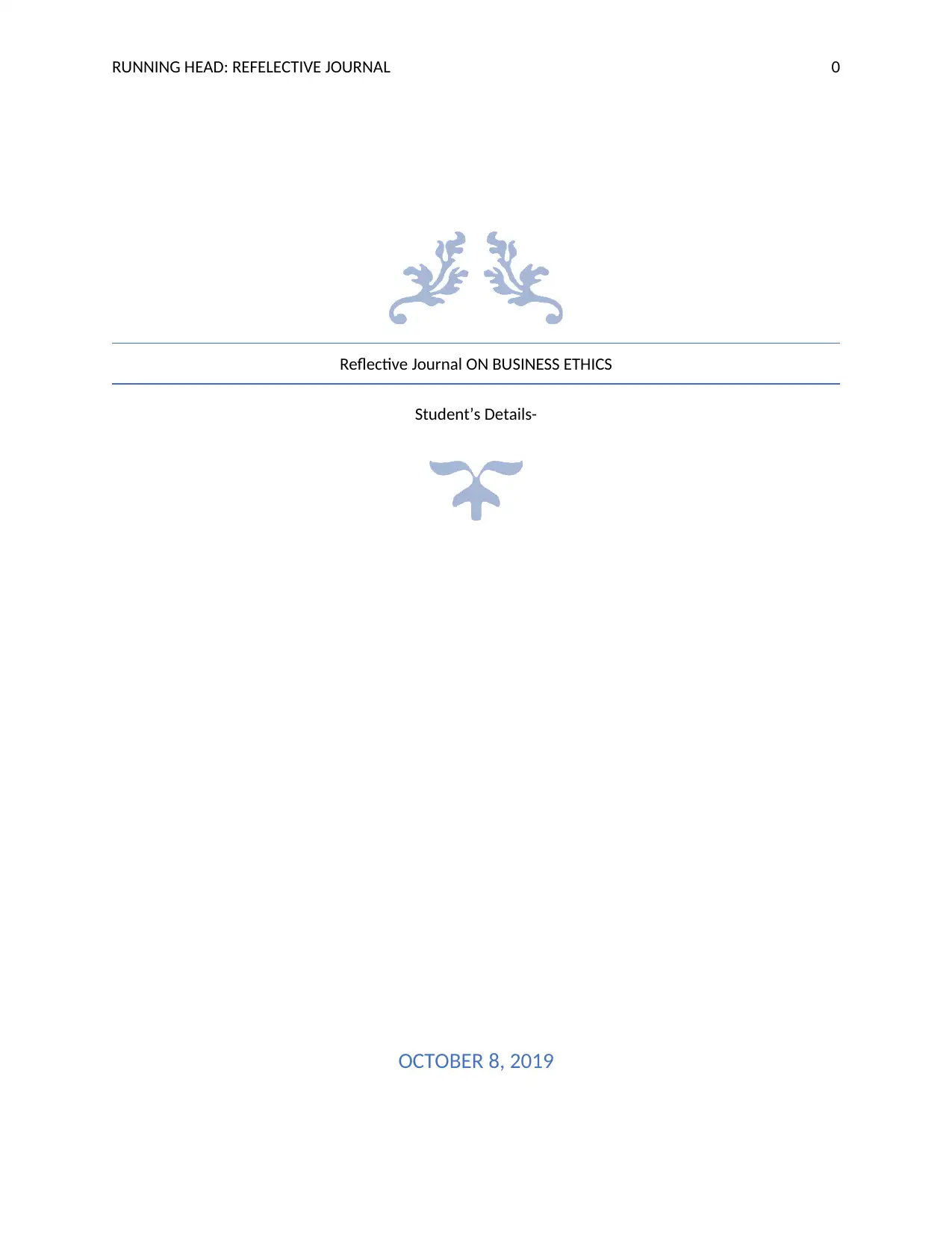
RUNNING HEAD: REFELECTIVE JOURNAL 0
Reflective Journal ON BUSINESS ETHICS
Student’s Details-
OCTOBER 8, 2019
Reflective Journal ON BUSINESS ETHICS
Student’s Details-
OCTOBER 8, 2019
Paraphrase This Document
Need a fresh take? Get an instant paraphrase of this document with our AI Paraphraser
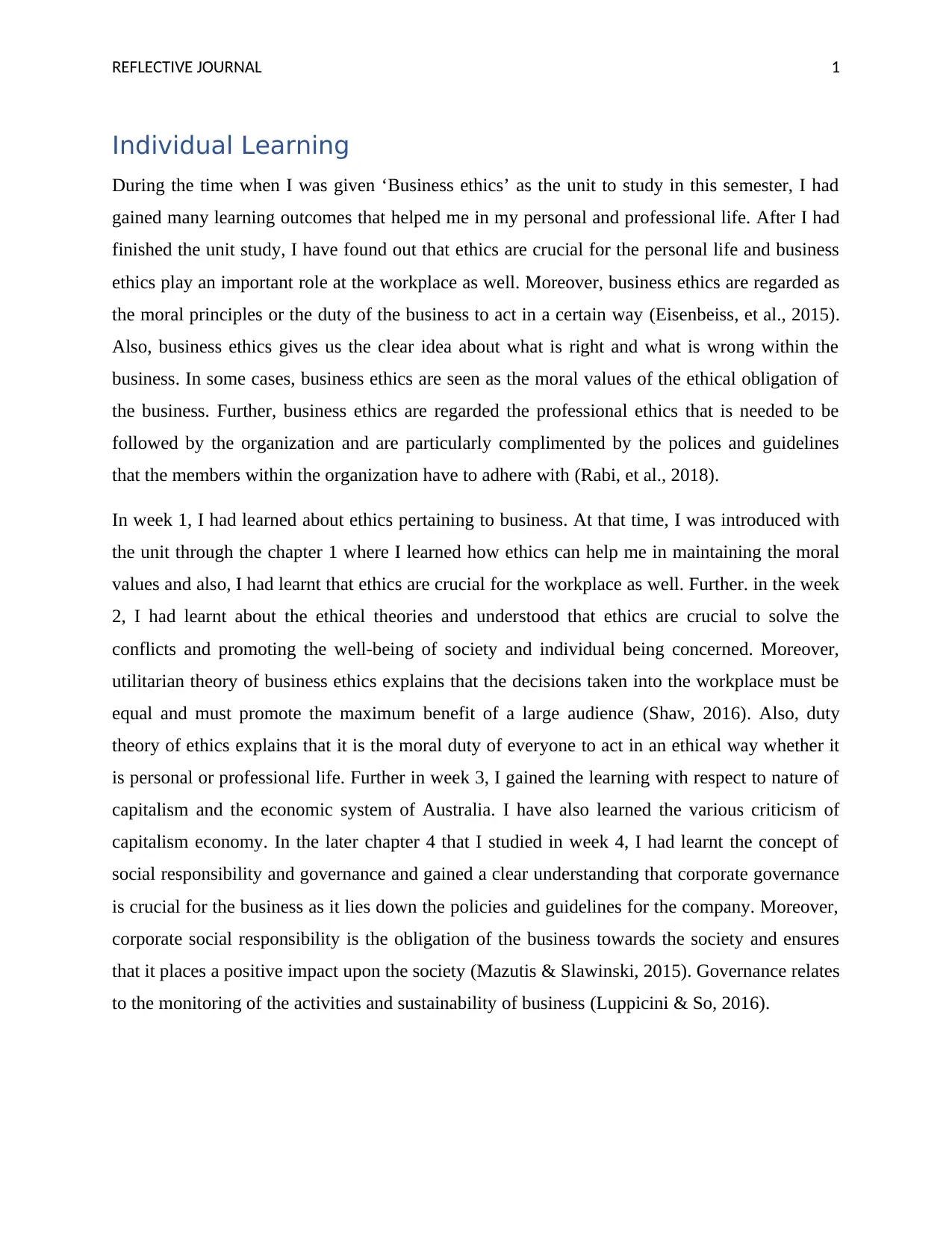
REFLECTIVE JOURNAL 1
Individual Learning
During the time when I was given ‘Business ethics’ as the unit to study in this semester, I had
gained many learning outcomes that helped me in my personal and professional life. After I had
finished the unit study, I have found out that ethics are crucial for the personal life and business
ethics play an important role at the workplace as well. Moreover, business ethics are regarded as
the moral principles or the duty of the business to act in a certain way (Eisenbeiss, et al., 2015).
Also, business ethics gives us the clear idea about what is right and what is wrong within the
business. In some cases, business ethics are seen as the moral values of the ethical obligation of
the business. Further, business ethics are regarded the professional ethics that is needed to be
followed by the organization and are particularly complimented by the polices and guidelines
that the members within the organization have to adhere with (Rabi, et al., 2018).
In week 1, I had learned about ethics pertaining to business. At that time, I was introduced with
the unit through the chapter 1 where I learned how ethics can help me in maintaining the moral
values and also, I had learnt that ethics are crucial for the workplace as well. Further. in the week
2, I had learnt about the ethical theories and understood that ethics are crucial to solve the
conflicts and promoting the well-being of society and individual being concerned. Moreover,
utilitarian theory of business ethics explains that the decisions taken into the workplace must be
equal and must promote the maximum benefit of a large audience (Shaw, 2016). Also, duty
theory of ethics explains that it is the moral duty of everyone to act in an ethical way whether it
is personal or professional life. Further in week 3, I gained the learning with respect to nature of
capitalism and the economic system of Australia. I have also learned the various criticism of
capitalism economy. In the later chapter 4 that I studied in week 4, I had learnt the concept of
social responsibility and governance and gained a clear understanding that corporate governance
is crucial for the business as it lies down the policies and guidelines for the company. Moreover,
corporate social responsibility is the obligation of the business towards the society and ensures
that it places a positive impact upon the society (Mazutis & Slawinski, 2015). Governance relates
to the monitoring of the activities and sustainability of business (Luppicini & So, 2016).
Individual Learning
During the time when I was given ‘Business ethics’ as the unit to study in this semester, I had
gained many learning outcomes that helped me in my personal and professional life. After I had
finished the unit study, I have found out that ethics are crucial for the personal life and business
ethics play an important role at the workplace as well. Moreover, business ethics are regarded as
the moral principles or the duty of the business to act in a certain way (Eisenbeiss, et al., 2015).
Also, business ethics gives us the clear idea about what is right and what is wrong within the
business. In some cases, business ethics are seen as the moral values of the ethical obligation of
the business. Further, business ethics are regarded the professional ethics that is needed to be
followed by the organization and are particularly complimented by the polices and guidelines
that the members within the organization have to adhere with (Rabi, et al., 2018).
In week 1, I had learned about ethics pertaining to business. At that time, I was introduced with
the unit through the chapter 1 where I learned how ethics can help me in maintaining the moral
values and also, I had learnt that ethics are crucial for the workplace as well. Further. in the week
2, I had learnt about the ethical theories and understood that ethics are crucial to solve the
conflicts and promoting the well-being of society and individual being concerned. Moreover,
utilitarian theory of business ethics explains that the decisions taken into the workplace must be
equal and must promote the maximum benefit of a large audience (Shaw, 2016). Also, duty
theory of ethics explains that it is the moral duty of everyone to act in an ethical way whether it
is personal or professional life. Further in week 3, I gained the learning with respect to nature of
capitalism and the economic system of Australia. I have also learned the various criticism of
capitalism economy. In the later chapter 4 that I studied in week 4, I had learnt the concept of
social responsibility and governance and gained a clear understanding that corporate governance
is crucial for the business as it lies down the policies and guidelines for the company. Moreover,
corporate social responsibility is the obligation of the business towards the society and ensures
that it places a positive impact upon the society (Mazutis & Slawinski, 2015). Governance relates
to the monitoring of the activities and sustainability of business (Luppicini & So, 2016).
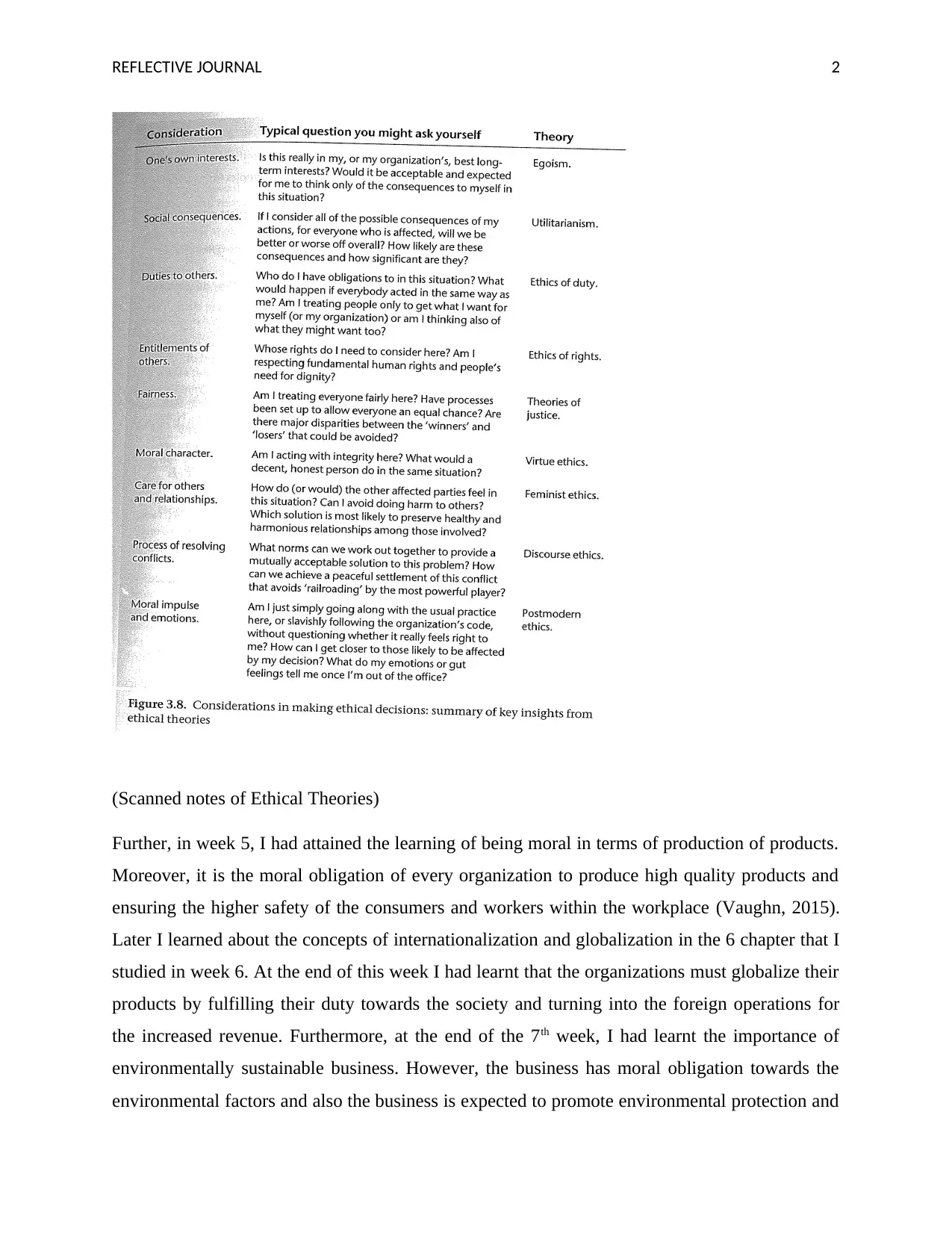
REFLECTIVE JOURNAL 2
(Scanned notes of Ethical Theories)
Further, in week 5, I had attained the learning of being moral in terms of production of products.
Moreover, it is the moral obligation of every organization to produce high quality products and
ensuring the higher safety of the consumers and workers within the workplace (Vaughn, 2015).
Later I learned about the concepts of internationalization and globalization in the 6 chapter that I
studied in week 6. At the end of this week I had learnt that the organizations must globalize their
products by fulfilling their duty towards the society and turning into the foreign operations for
the increased revenue. Furthermore, at the end of the 7th week, I had learnt the importance of
environmentally sustainable business. However, the business has moral obligation towards the
environmental factors and also the business is expected to promote environmental protection and
(Scanned notes of Ethical Theories)
Further, in week 5, I had attained the learning of being moral in terms of production of products.
Moreover, it is the moral obligation of every organization to produce high quality products and
ensuring the higher safety of the consumers and workers within the workplace (Vaughn, 2015).
Later I learned about the concepts of internationalization and globalization in the 6 chapter that I
studied in week 6. At the end of this week I had learnt that the organizations must globalize their
products by fulfilling their duty towards the society and turning into the foreign operations for
the increased revenue. Furthermore, at the end of the 7th week, I had learnt the importance of
environmentally sustainable business. However, the business has moral obligation towards the
environmental factors and also the business is expected to promote environmental protection and
⊘ This is a preview!⊘
Do you want full access?
Subscribe today to unlock all pages.

Trusted by 1+ million students worldwide
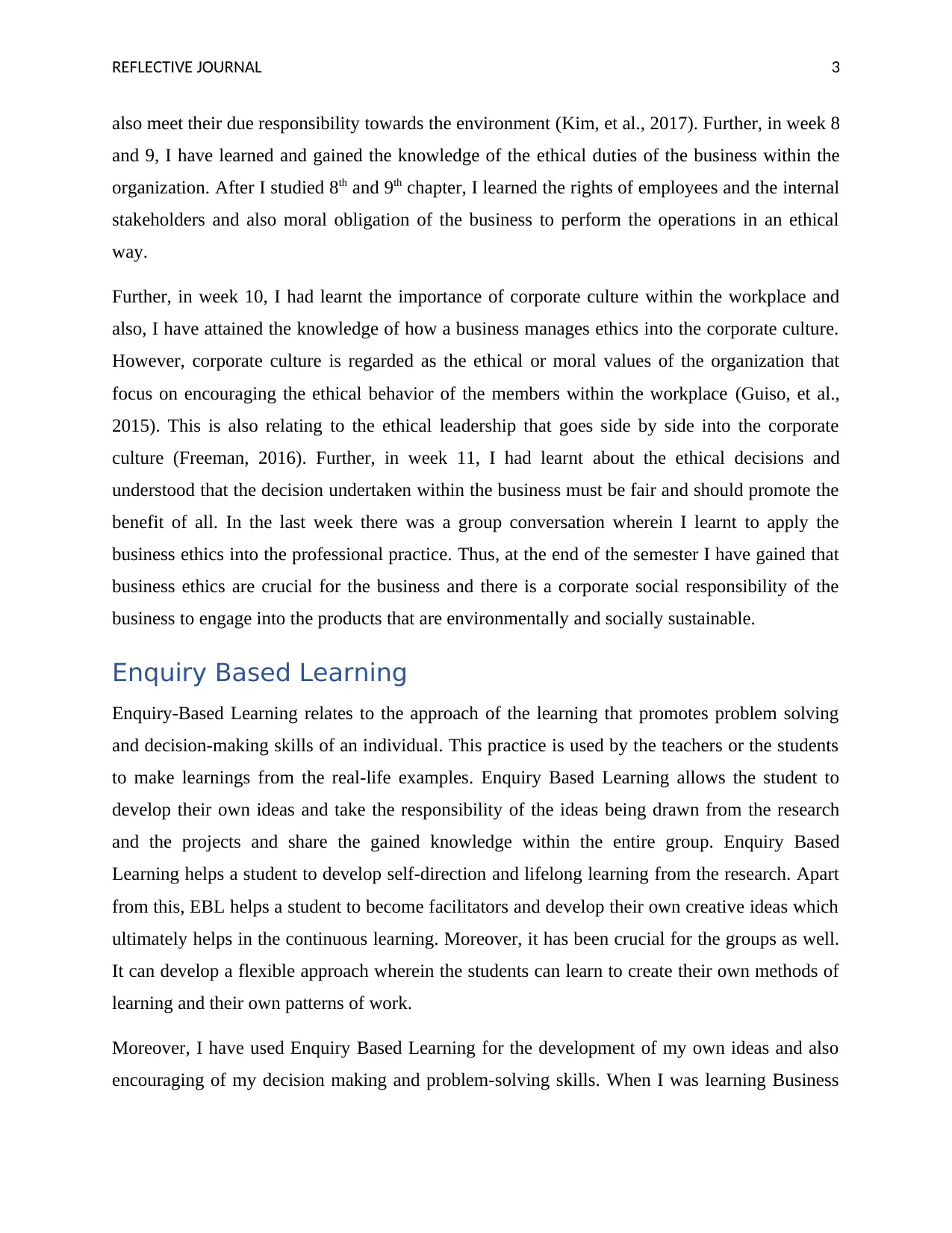
REFLECTIVE JOURNAL 3
also meet their due responsibility towards the environment (Kim, et al., 2017). Further, in week 8
and 9, I have learned and gained the knowledge of the ethical duties of the business within the
organization. After I studied 8th and 9th chapter, I learned the rights of employees and the internal
stakeholders and also moral obligation of the business to perform the operations in an ethical
way.
Further, in week 10, I had learnt the importance of corporate culture within the workplace and
also, I have attained the knowledge of how a business manages ethics into the corporate culture.
However, corporate culture is regarded as the ethical or moral values of the organization that
focus on encouraging the ethical behavior of the members within the workplace (Guiso, et al.,
2015). This is also relating to the ethical leadership that goes side by side into the corporate
culture (Freeman, 2016). Further, in week 11, I had learnt about the ethical decisions and
understood that the decision undertaken within the business must be fair and should promote the
benefit of all. In the last week there was a group conversation wherein I learnt to apply the
business ethics into the professional practice. Thus, at the end of the semester I have gained that
business ethics are crucial for the business and there is a corporate social responsibility of the
business to engage into the products that are environmentally and socially sustainable.
Enquiry Based Learning
Enquiry-Based Learning relates to the approach of the learning that promotes problem solving
and decision-making skills of an individual. This practice is used by the teachers or the students
to make learnings from the real-life examples. Enquiry Based Learning allows the student to
develop their own ideas and take the responsibility of the ideas being drawn from the research
and the projects and share the gained knowledge within the entire group. Enquiry Based
Learning helps a student to develop self-direction and lifelong learning from the research. Apart
from this, EBL helps a student to become facilitators and develop their own creative ideas which
ultimately helps in the continuous learning. Moreover, it has been crucial for the groups as well.
It can develop a flexible approach wherein the students can learn to create their own methods of
learning and their own patterns of work.
Moreover, I have used Enquiry Based Learning for the development of my own ideas and also
encouraging of my decision making and problem-solving skills. When I was learning Business
also meet their due responsibility towards the environment (Kim, et al., 2017). Further, in week 8
and 9, I have learned and gained the knowledge of the ethical duties of the business within the
organization. After I studied 8th and 9th chapter, I learned the rights of employees and the internal
stakeholders and also moral obligation of the business to perform the operations in an ethical
way.
Further, in week 10, I had learnt the importance of corporate culture within the workplace and
also, I have attained the knowledge of how a business manages ethics into the corporate culture.
However, corporate culture is regarded as the ethical or moral values of the organization that
focus on encouraging the ethical behavior of the members within the workplace (Guiso, et al.,
2015). This is also relating to the ethical leadership that goes side by side into the corporate
culture (Freeman, 2016). Further, in week 11, I had learnt about the ethical decisions and
understood that the decision undertaken within the business must be fair and should promote the
benefit of all. In the last week there was a group conversation wherein I learnt to apply the
business ethics into the professional practice. Thus, at the end of the semester I have gained that
business ethics are crucial for the business and there is a corporate social responsibility of the
business to engage into the products that are environmentally and socially sustainable.
Enquiry Based Learning
Enquiry-Based Learning relates to the approach of the learning that promotes problem solving
and decision-making skills of an individual. This practice is used by the teachers or the students
to make learnings from the real-life examples. Enquiry Based Learning allows the student to
develop their own ideas and take the responsibility of the ideas being drawn from the research
and the projects and share the gained knowledge within the entire group. Enquiry Based
Learning helps a student to develop self-direction and lifelong learning from the research. Apart
from this, EBL helps a student to become facilitators and develop their own creative ideas which
ultimately helps in the continuous learning. Moreover, it has been crucial for the groups as well.
It can develop a flexible approach wherein the students can learn to create their own methods of
learning and their own patterns of work.
Moreover, I have used Enquiry Based Learning for the development of my own ideas and also
encouraging of my decision making and problem-solving skills. When I was learning Business
Paraphrase This Document
Need a fresh take? Get an instant paraphrase of this document with our AI Paraphraser
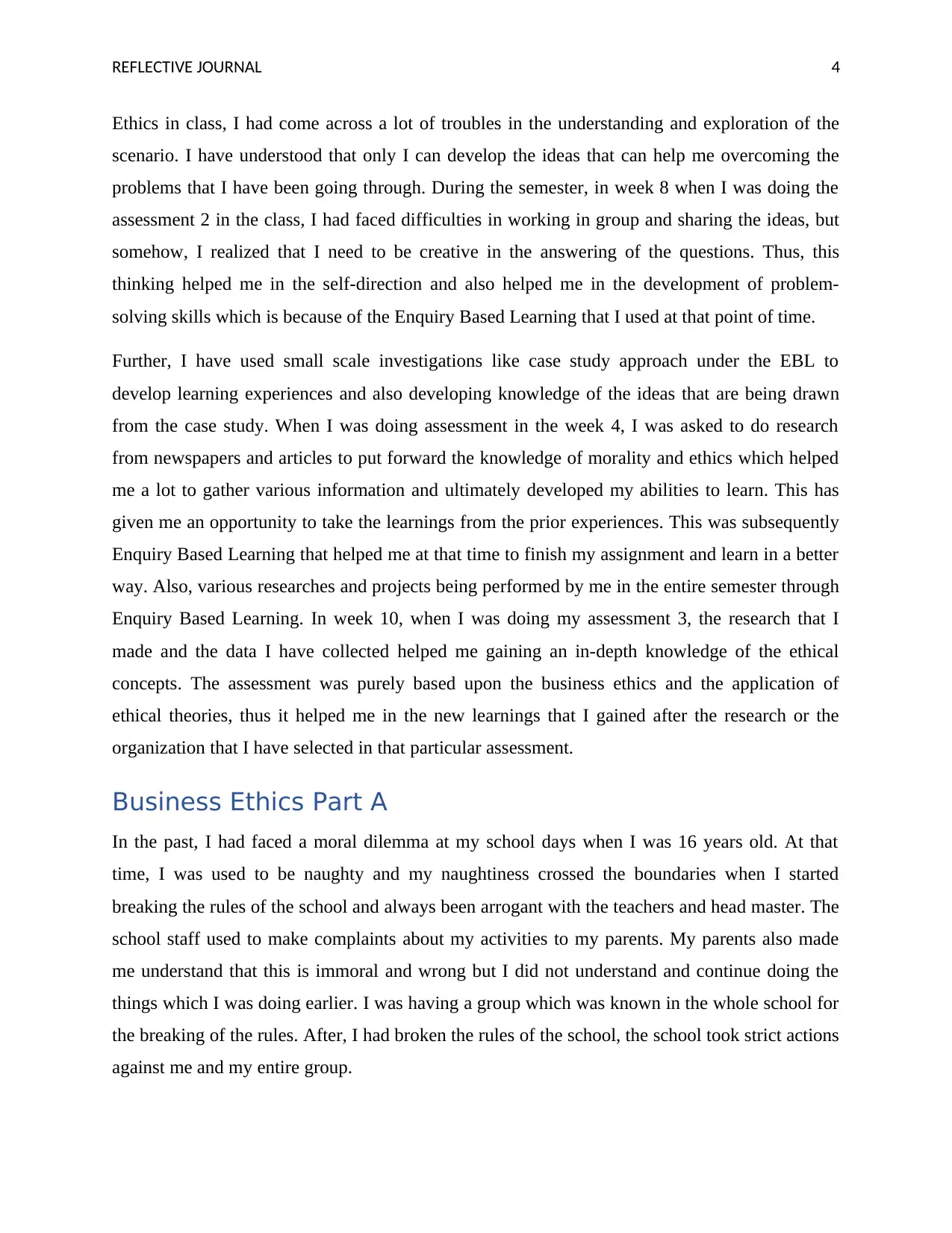
REFLECTIVE JOURNAL 4
Ethics in class, I had come across a lot of troubles in the understanding and exploration of the
scenario. I have understood that only I can develop the ideas that can help me overcoming the
problems that I have been going through. During the semester, in week 8 when I was doing the
assessment 2 in the class, I had faced difficulties in working in group and sharing the ideas, but
somehow, I realized that I need to be creative in the answering of the questions. Thus, this
thinking helped me in the self-direction and also helped me in the development of problem-
solving skills which is because of the Enquiry Based Learning that I used at that point of time.
Further, I have used small scale investigations like case study approach under the EBL to
develop learning experiences and also developing knowledge of the ideas that are being drawn
from the case study. When I was doing assessment in the week 4, I was asked to do research
from newspapers and articles to put forward the knowledge of morality and ethics which helped
me a lot to gather various information and ultimately developed my abilities to learn. This has
given me an opportunity to take the learnings from the prior experiences. This was subsequently
Enquiry Based Learning that helped me at that time to finish my assignment and learn in a better
way. Also, various researches and projects being performed by me in the entire semester through
Enquiry Based Learning. In week 10, when I was doing my assessment 3, the research that I
made and the data I have collected helped me gaining an in-depth knowledge of the ethical
concepts. The assessment was purely based upon the business ethics and the application of
ethical theories, thus it helped me in the new learnings that I gained after the research or the
organization that I have selected in that particular assessment.
Business Ethics Part A
In the past, I had faced a moral dilemma at my school days when I was 16 years old. At that
time, I was used to be naughty and my naughtiness crossed the boundaries when I started
breaking the rules of the school and always been arrogant with the teachers and head master. The
school staff used to make complaints about my activities to my parents. My parents also made
me understand that this is immoral and wrong but I did not understand and continue doing the
things which I was doing earlier. I was having a group which was known in the whole school for
the breaking of the rules. After, I had broken the rules of the school, the school took strict actions
against me and my entire group.
Ethics in class, I had come across a lot of troubles in the understanding and exploration of the
scenario. I have understood that only I can develop the ideas that can help me overcoming the
problems that I have been going through. During the semester, in week 8 when I was doing the
assessment 2 in the class, I had faced difficulties in working in group and sharing the ideas, but
somehow, I realized that I need to be creative in the answering of the questions. Thus, this
thinking helped me in the self-direction and also helped me in the development of problem-
solving skills which is because of the Enquiry Based Learning that I used at that point of time.
Further, I have used small scale investigations like case study approach under the EBL to
develop learning experiences and also developing knowledge of the ideas that are being drawn
from the case study. When I was doing assessment in the week 4, I was asked to do research
from newspapers and articles to put forward the knowledge of morality and ethics which helped
me a lot to gather various information and ultimately developed my abilities to learn. This has
given me an opportunity to take the learnings from the prior experiences. This was subsequently
Enquiry Based Learning that helped me at that time to finish my assignment and learn in a better
way. Also, various researches and projects being performed by me in the entire semester through
Enquiry Based Learning. In week 10, when I was doing my assessment 3, the research that I
made and the data I have collected helped me gaining an in-depth knowledge of the ethical
concepts. The assessment was purely based upon the business ethics and the application of
ethical theories, thus it helped me in the new learnings that I gained after the research or the
organization that I have selected in that particular assessment.
Business Ethics Part A
In the past, I had faced a moral dilemma at my school days when I was 16 years old. At that
time, I was used to be naughty and my naughtiness crossed the boundaries when I started
breaking the rules of the school and always been arrogant with the teachers and head master. The
school staff used to make complaints about my activities to my parents. My parents also made
me understand that this is immoral and wrong but I did not understand and continue doing the
things which I was doing earlier. I was having a group which was known in the whole school for
the breaking of the rules. After, I had broken the rules of the school, the school took strict actions
against me and my entire group.
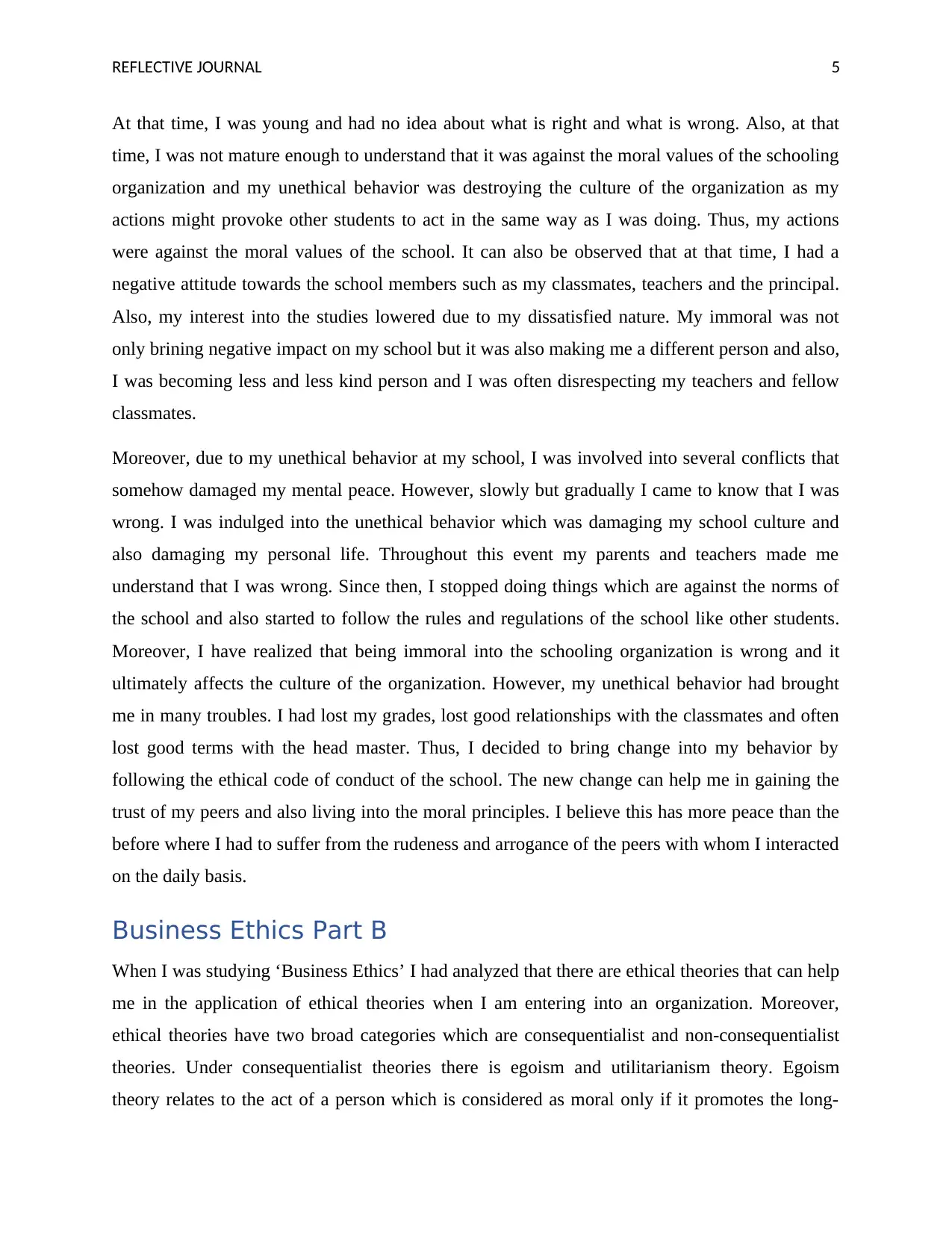
REFLECTIVE JOURNAL 5
At that time, I was young and had no idea about what is right and what is wrong. Also, at that
time, I was not mature enough to understand that it was against the moral values of the schooling
organization and my unethical behavior was destroying the culture of the organization as my
actions might provoke other students to act in the same way as I was doing. Thus, my actions
were against the moral values of the school. It can also be observed that at that time, I had a
negative attitude towards the school members such as my classmates, teachers and the principal.
Also, my interest into the studies lowered due to my dissatisfied nature. My immoral was not
only brining negative impact on my school but it was also making me a different person and also,
I was becoming less and less kind person and I was often disrespecting my teachers and fellow
classmates.
Moreover, due to my unethical behavior at my school, I was involved into several conflicts that
somehow damaged my mental peace. However, slowly but gradually I came to know that I was
wrong. I was indulged into the unethical behavior which was damaging my school culture and
also damaging my personal life. Throughout this event my parents and teachers made me
understand that I was wrong. Since then, I stopped doing things which are against the norms of
the school and also started to follow the rules and regulations of the school like other students.
Moreover, I have realized that being immoral into the schooling organization is wrong and it
ultimately affects the culture of the organization. However, my unethical behavior had brought
me in many troubles. I had lost my grades, lost good relationships with the classmates and often
lost good terms with the head master. Thus, I decided to bring change into my behavior by
following the ethical code of conduct of the school. The new change can help me in gaining the
trust of my peers and also living into the moral principles. I believe this has more peace than the
before where I had to suffer from the rudeness and arrogance of the peers with whom I interacted
on the daily basis.
Business Ethics Part B
When I was studying ‘Business Ethics’ I had analyzed that there are ethical theories that can help
me in the application of ethical theories when I am entering into an organization. Moreover,
ethical theories have two broad categories which are consequentialist and non-consequentialist
theories. Under consequentialist theories there is egoism and utilitarianism theory. Egoism
theory relates to the act of a person which is considered as moral only if it promotes the long-
At that time, I was young and had no idea about what is right and what is wrong. Also, at that
time, I was not mature enough to understand that it was against the moral values of the schooling
organization and my unethical behavior was destroying the culture of the organization as my
actions might provoke other students to act in the same way as I was doing. Thus, my actions
were against the moral values of the school. It can also be observed that at that time, I had a
negative attitude towards the school members such as my classmates, teachers and the principal.
Also, my interest into the studies lowered due to my dissatisfied nature. My immoral was not
only brining negative impact on my school but it was also making me a different person and also,
I was becoming less and less kind person and I was often disrespecting my teachers and fellow
classmates.
Moreover, due to my unethical behavior at my school, I was involved into several conflicts that
somehow damaged my mental peace. However, slowly but gradually I came to know that I was
wrong. I was indulged into the unethical behavior which was damaging my school culture and
also damaging my personal life. Throughout this event my parents and teachers made me
understand that I was wrong. Since then, I stopped doing things which are against the norms of
the school and also started to follow the rules and regulations of the school like other students.
Moreover, I have realized that being immoral into the schooling organization is wrong and it
ultimately affects the culture of the organization. However, my unethical behavior had brought
me in many troubles. I had lost my grades, lost good relationships with the classmates and often
lost good terms with the head master. Thus, I decided to bring change into my behavior by
following the ethical code of conduct of the school. The new change can help me in gaining the
trust of my peers and also living into the moral principles. I believe this has more peace than the
before where I had to suffer from the rudeness and arrogance of the peers with whom I interacted
on the daily basis.
Business Ethics Part B
When I was studying ‘Business Ethics’ I had analyzed that there are ethical theories that can help
me in the application of ethical theories when I am entering into an organization. Moreover,
ethical theories have two broad categories which are consequentialist and non-consequentialist
theories. Under consequentialist theories there is egoism and utilitarianism theory. Egoism
theory relates to the act of a person which is considered as moral only if it promotes the long-
⊘ This is a preview!⊘
Do you want full access?
Subscribe today to unlock all pages.

Trusted by 1+ million students worldwide
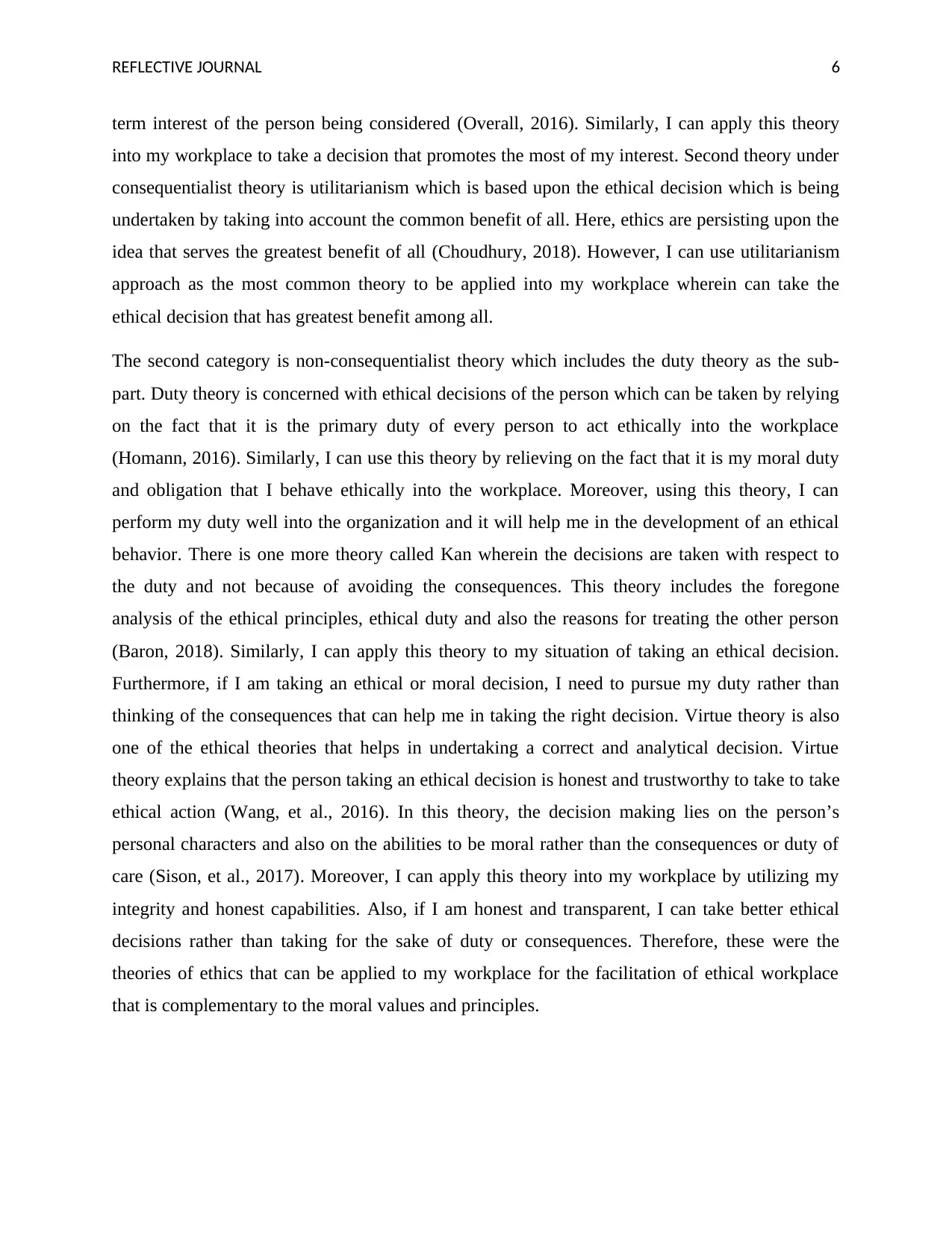
REFLECTIVE JOURNAL 6
term interest of the person being considered (Overall, 2016). Similarly, I can apply this theory
into my workplace to take a decision that promotes the most of my interest. Second theory under
consequentialist theory is utilitarianism which is based upon the ethical decision which is being
undertaken by taking into account the common benefit of all. Here, ethics are persisting upon the
idea that serves the greatest benefit of all (Choudhury, 2018). However, I can use utilitarianism
approach as the most common theory to be applied into my workplace wherein can take the
ethical decision that has greatest benefit among all.
The second category is non-consequentialist theory which includes the duty theory as the sub-
part. Duty theory is concerned with ethical decisions of the person which can be taken by relying
on the fact that it is the primary duty of every person to act ethically into the workplace
(Homann, 2016). Similarly, I can use this theory by relieving on the fact that it is my moral duty
and obligation that I behave ethically into the workplace. Moreover, using this theory, I can
perform my duty well into the organization and it will help me in the development of an ethical
behavior. There is one more theory called Kan wherein the decisions are taken with respect to
the duty and not because of avoiding the consequences. This theory includes the foregone
analysis of the ethical principles, ethical duty and also the reasons for treating the other person
(Baron, 2018). Similarly, I can apply this theory to my situation of taking an ethical decision.
Furthermore, if I am taking an ethical or moral decision, I need to pursue my duty rather than
thinking of the consequences that can help me in taking the right decision. Virtue theory is also
one of the ethical theories that helps in undertaking a correct and analytical decision. Virtue
theory explains that the person taking an ethical decision is honest and trustworthy to take to take
ethical action (Wang, et al., 2016). In this theory, the decision making lies on the person’s
personal characters and also on the abilities to be moral rather than the consequences or duty of
care (Sison, et al., 2017). Moreover, I can apply this theory into my workplace by utilizing my
integrity and honest capabilities. Also, if I am honest and transparent, I can take better ethical
decisions rather than taking for the sake of duty or consequences. Therefore, these were the
theories of ethics that can be applied to my workplace for the facilitation of ethical workplace
that is complementary to the moral values and principles.
term interest of the person being considered (Overall, 2016). Similarly, I can apply this theory
into my workplace to take a decision that promotes the most of my interest. Second theory under
consequentialist theory is utilitarianism which is based upon the ethical decision which is being
undertaken by taking into account the common benefit of all. Here, ethics are persisting upon the
idea that serves the greatest benefit of all (Choudhury, 2018). However, I can use utilitarianism
approach as the most common theory to be applied into my workplace wherein can take the
ethical decision that has greatest benefit among all.
The second category is non-consequentialist theory which includes the duty theory as the sub-
part. Duty theory is concerned with ethical decisions of the person which can be taken by relying
on the fact that it is the primary duty of every person to act ethically into the workplace
(Homann, 2016). Similarly, I can use this theory by relieving on the fact that it is my moral duty
and obligation that I behave ethically into the workplace. Moreover, using this theory, I can
perform my duty well into the organization and it will help me in the development of an ethical
behavior. There is one more theory called Kan wherein the decisions are taken with respect to
the duty and not because of avoiding the consequences. This theory includes the foregone
analysis of the ethical principles, ethical duty and also the reasons for treating the other person
(Baron, 2018). Similarly, I can apply this theory to my situation of taking an ethical decision.
Furthermore, if I am taking an ethical or moral decision, I need to pursue my duty rather than
thinking of the consequences that can help me in taking the right decision. Virtue theory is also
one of the ethical theories that helps in undertaking a correct and analytical decision. Virtue
theory explains that the person taking an ethical decision is honest and trustworthy to take to take
ethical action (Wang, et al., 2016). In this theory, the decision making lies on the person’s
personal characters and also on the abilities to be moral rather than the consequences or duty of
care (Sison, et al., 2017). Moreover, I can apply this theory into my workplace by utilizing my
integrity and honest capabilities. Also, if I am honest and transparent, I can take better ethical
decisions rather than taking for the sake of duty or consequences. Therefore, these were the
theories of ethics that can be applied to my workplace for the facilitation of ethical workplace
that is complementary to the moral values and principles.
Paraphrase This Document
Need a fresh take? Get an instant paraphrase of this document with our AI Paraphraser
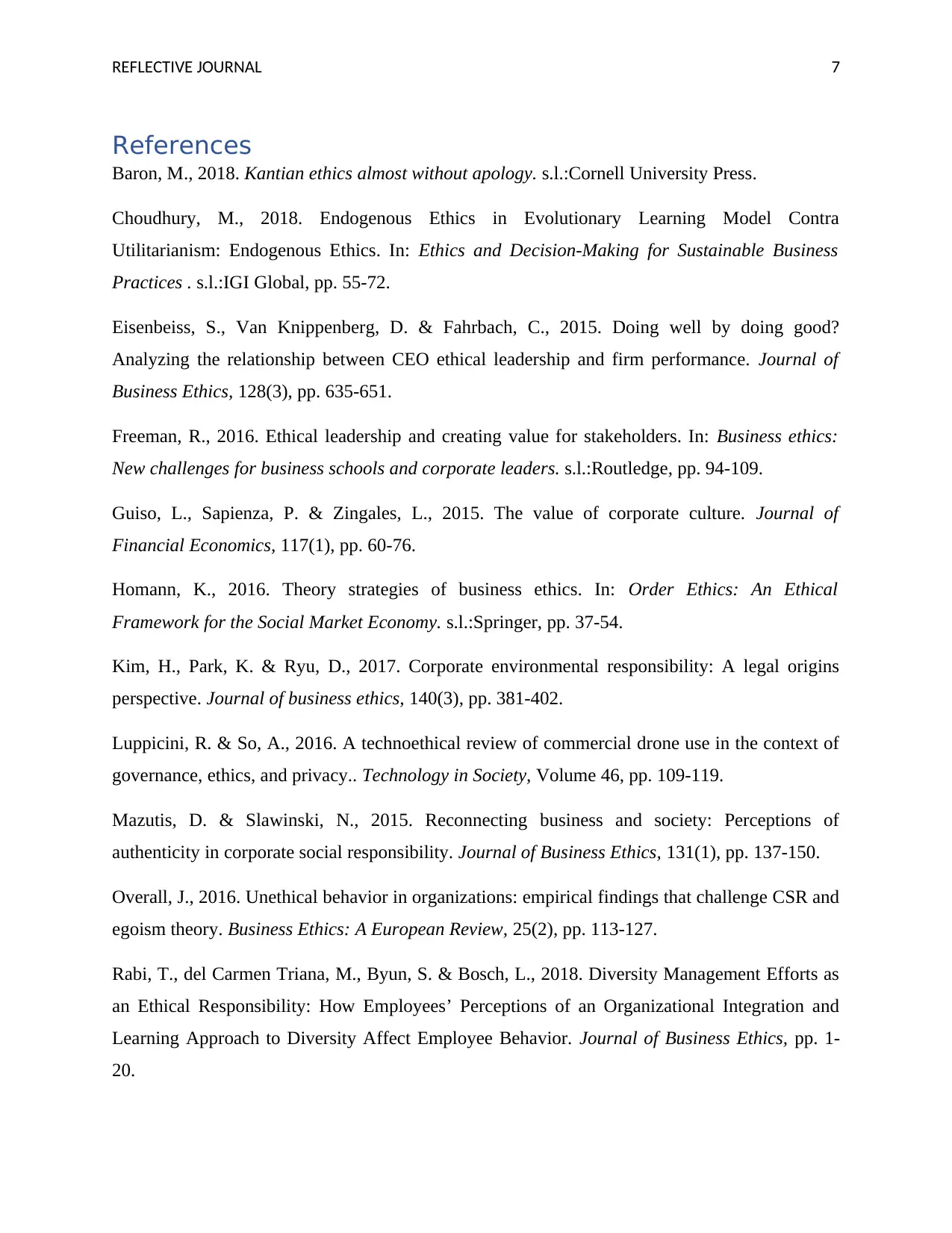
REFLECTIVE JOURNAL 7
References
Baron, M., 2018. Kantian ethics almost without apology. s.l.:Cornell University Press.
Choudhury, M., 2018. Endogenous Ethics in Evolutionary Learning Model Contra
Utilitarianism: Endogenous Ethics. In: Ethics and Decision-Making for Sustainable Business
Practices . s.l.:IGI Global, pp. 55-72.
Eisenbeiss, S., Van Knippenberg, D. & Fahrbach, C., 2015. Doing well by doing good?
Analyzing the relationship between CEO ethical leadership and firm performance. Journal of
Business Ethics, 128(3), pp. 635-651.
Freeman, R., 2016. Ethical leadership and creating value for stakeholders. In: Business ethics:
New challenges for business schools and corporate leaders. s.l.:Routledge, pp. 94-109.
Guiso, L., Sapienza, P. & Zingales, L., 2015. The value of corporate culture. Journal of
Financial Economics, 117(1), pp. 60-76.
Homann, K., 2016. Theory strategies of business ethics. In: Order Ethics: An Ethical
Framework for the Social Market Economy. s.l.:Springer, pp. 37-54.
Kim, H., Park, K. & Ryu, D., 2017. Corporate environmental responsibility: A legal origins
perspective. Journal of business ethics, 140(3), pp. 381-402.
Luppicini, R. & So, A., 2016. A technoethical review of commercial drone use in the context of
governance, ethics, and privacy.. Technology in Society, Volume 46, pp. 109-119.
Mazutis, D. & Slawinski, N., 2015. Reconnecting business and society: Perceptions of
authenticity in corporate social responsibility. Journal of Business Ethics, 131(1), pp. 137-150.
Overall, J., 2016. Unethical behavior in organizations: empirical findings that challenge CSR and
egoism theory. Business Ethics: A European Review, 25(2), pp. 113-127.
Rabi, T., del Carmen Triana, M., Byun, S. & Bosch, L., 2018. Diversity Management Efforts as
an Ethical Responsibility: How Employees’ Perceptions of an Organizational Integration and
Learning Approach to Diversity Affect Employee Behavior. Journal of Business Ethics, pp. 1-
20.
References
Baron, M., 2018. Kantian ethics almost without apology. s.l.:Cornell University Press.
Choudhury, M., 2018. Endogenous Ethics in Evolutionary Learning Model Contra
Utilitarianism: Endogenous Ethics. In: Ethics and Decision-Making for Sustainable Business
Practices . s.l.:IGI Global, pp. 55-72.
Eisenbeiss, S., Van Knippenberg, D. & Fahrbach, C., 2015. Doing well by doing good?
Analyzing the relationship between CEO ethical leadership and firm performance. Journal of
Business Ethics, 128(3), pp. 635-651.
Freeman, R., 2016. Ethical leadership and creating value for stakeholders. In: Business ethics:
New challenges for business schools and corporate leaders. s.l.:Routledge, pp. 94-109.
Guiso, L., Sapienza, P. & Zingales, L., 2015. The value of corporate culture. Journal of
Financial Economics, 117(1), pp. 60-76.
Homann, K., 2016. Theory strategies of business ethics. In: Order Ethics: An Ethical
Framework for the Social Market Economy. s.l.:Springer, pp. 37-54.
Kim, H., Park, K. & Ryu, D., 2017. Corporate environmental responsibility: A legal origins
perspective. Journal of business ethics, 140(3), pp. 381-402.
Luppicini, R. & So, A., 2016. A technoethical review of commercial drone use in the context of
governance, ethics, and privacy.. Technology in Society, Volume 46, pp. 109-119.
Mazutis, D. & Slawinski, N., 2015. Reconnecting business and society: Perceptions of
authenticity in corporate social responsibility. Journal of Business Ethics, 131(1), pp. 137-150.
Overall, J., 2016. Unethical behavior in organizations: empirical findings that challenge CSR and
egoism theory. Business Ethics: A European Review, 25(2), pp. 113-127.
Rabi, T., del Carmen Triana, M., Byun, S. & Bosch, L., 2018. Diversity Management Efforts as
an Ethical Responsibility: How Employees’ Perceptions of an Organizational Integration and
Learning Approach to Diversity Affect Employee Behavior. Journal of Business Ethics, pp. 1-
20.
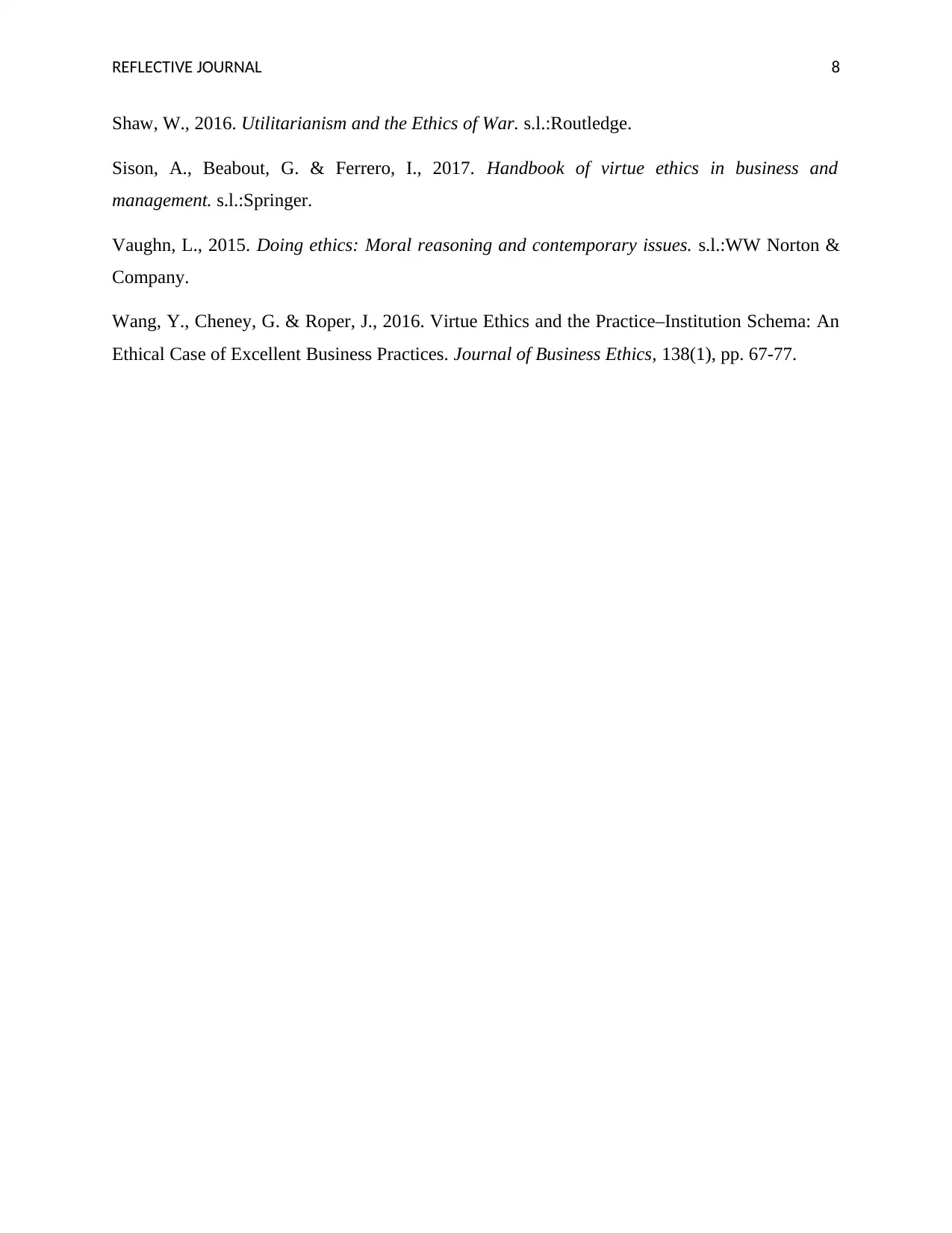
REFLECTIVE JOURNAL 8
Shaw, W., 2016. Utilitarianism and the Ethics of War. s.l.:Routledge.
Sison, A., Beabout, G. & Ferrero, I., 2017. Handbook of virtue ethics in business and
management. s.l.:Springer.
Vaughn, L., 2015. Doing ethics: Moral reasoning and contemporary issues. s.l.:WW Norton &
Company.
Wang, Y., Cheney, G. & Roper, J., 2016. Virtue Ethics and the Practice–Institution Schema: An
Ethical Case of Excellent Business Practices. Journal of Business Ethics, 138(1), pp. 67-77.
Shaw, W., 2016. Utilitarianism and the Ethics of War. s.l.:Routledge.
Sison, A., Beabout, G. & Ferrero, I., 2017. Handbook of virtue ethics in business and
management. s.l.:Springer.
Vaughn, L., 2015. Doing ethics: Moral reasoning and contemporary issues. s.l.:WW Norton &
Company.
Wang, Y., Cheney, G. & Roper, J., 2016. Virtue Ethics and the Practice–Institution Schema: An
Ethical Case of Excellent Business Practices. Journal of Business Ethics, 138(1), pp. 67-77.
⊘ This is a preview!⊘
Do you want full access?
Subscribe today to unlock all pages.

Trusted by 1+ million students worldwide
1 out of 9
Related Documents
Your All-in-One AI-Powered Toolkit for Academic Success.
+13062052269
info@desklib.com
Available 24*7 on WhatsApp / Email
![[object Object]](/_next/static/media/star-bottom.7253800d.svg)
Unlock your academic potential
Copyright © 2020–2025 A2Z Services. All Rights Reserved. Developed and managed by ZUCOL.





